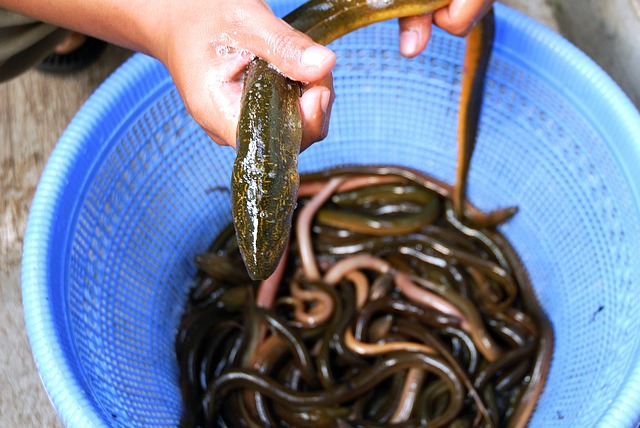October 31, 2022
By Lynda Kiernan-Stone, Global AgInvesting Media
Baby eels (called elvers) are the most valuable species on the fish market, often fetching more than $2,000 per pound at the dock – more than 10 times the value of lobster.
One factor driving these prices is the overfishing of freshwater eels, endangering wild populations. In Europe, the Anguilla anguilla, or European eel, is threatened to the point where it is listed in CITES Appendix II, included in a list of species for which trade must be strictly managed after data from the Council for the Exploration of the Sea (ICES) warned that stock of this eel was “outside safe biological limits” and in need of a critical plan for recovery.
Another contributing factor is that eels cannot be bred in captivity. When able to procreate, they swim more than 4,000 miles to one of two locations, either the Sargasso Sea, or off the coast of Guam, where after they breed, they die.
This can lead to some less than ethical dealings, as evidenced in May of this year when the U.S. federal government indicted the country’s largest importer and wholesaler of eel meat located in New Jersey for unlawfully smuggling large quantities of baby European eels out of Europe to China.
I didn’t know the stakes in the eel meat market were so high! And as the demand for eel meat in European and Asian markets continues to drive up the value, it is creating an opportunity for bioagtech companies to provide solutions.
One such is Israel’s Forsea Foods, which just closed on $5.2 million in Seed funding led by Berlin-based Target Global, marking that investor’s first capital commitment in the food tech space.
Also participating in the round were The Kitchen FoodTech Hub, PeakBridge VC, Zora Ventures, FoodHack, and Milk & Honey Ventures.
Co-founded in October 2021 by biotech engineer Roee Nir, MBA; Iftach Nachman, PhD; and Yaniv Elkouby, PhD, with support from the Israeli Innovation Authority (IIA) and The Kitchen Hub, Forsea’s mission is to preserve wild populations and protect fragile ecosystems by offering a viable alternative to wild caught seafood.
The company’s novel production method uses a non-GMO organoid platform developed by Iftach Nachman, in which the eel meat is grown ex vivo as a three dimensional tissue structure without the use of scaffolding. This process produces fish meat in the same way it would grow in a living fish – a simpler process that requires fewer bioreactors and is more cost effective compared to traditional cell culturing.
“We can produce a product identical in flavor, texture, appearance, and nutritional values to real eel,” noted Nir, CEO of Forsea. “Organoid platform allows us to design the fish filet exactly as it grows in the fish, that is, in a 3-dimensional structure, without growing the fat and muscle tissues separately.”
Shmuel Chafets, executive chairman and founder of Target Global, added, “Forsea is poised to make a dramatic impact on the seafood ecosystem. Its pillar platform solves a bottleneck in the cultivated meat industry by creating affordable, ethical, cultivated seafood products that can replace vulnerable fish species.”
This funding will initially be used to grow cultivated eel meat destined to meet high demand for kabayaki and sushi. The company plans to inaugurate its pilot plant next year which will allow the company to create a preliminary design for a large-scale alpha production system and to launch the company’s first products.
“We are very excited to announce the completion of this funding round,” said Nir. “Our investors express their trust in our game-changing technology for producing seafood with a minimal footprint on the environment. The patented organoid technology allows us to contribute to a safe and more resilient food system consumers demand.”
The capital will also support Forsea in accelerating R&D for both growing eel meat and developing new processing to grow other species. It will enable the company to improve and expand upon its core technology with the goal of achieving organoid growth in large-scale bioreactors, while also raising yields and reducing cost of production.
“We can produce a product identical in flavor, texture, appearance, and nutritional values to real eel,” noted Nir. “Organoid platform allows us to design the fish filet exactly as it grows in the fish, that is, in a 3-dimensional structure, without growing the fat and muscle tissues separately.”
“Depletion of world fisheries is a major threat to our food security,” concluded Amir Zaidman, chief business officer, The Kitchen Hub. “For this reason, we teamed up with Nir and the founding team and backed Forsea from its inception at The Kitchen. We are proud to continue our support and to participate in the seed round of Forsea as it continues to attain its goals.”
~ Lynda Kiernan-Stone is editor in chief with GAI Media, and is managing editor and daily contributor for Global AgInvesting’s AgInvesting Weekly News and Agtech Intel News, as well as HighQuest Group’s Unconventional Ag. She can be reached at lkiernan-stone@
*The content put forth by Global AgInvesting News and its parent company HighQuest Partners is intended to be used and must be used for informational purposes only. All information or other material herein is not to be construed as legal, tax, investment, financial, or other advice. Global AgInvesting and HighQuest Partners are not a fiduciary in any manner, and the reader assumes the sole responsibility of evaluating the merits and risks associated with the use of any information or other content on this site.

Let GAI News inform your engagement in the agriculture sector.
GAI News provides crucial and timely news and insight to help you stay ahead of critical agricultural trends through free delivery of two weekly newsletters, Ag Investing Weekly and AgTech Intel.




